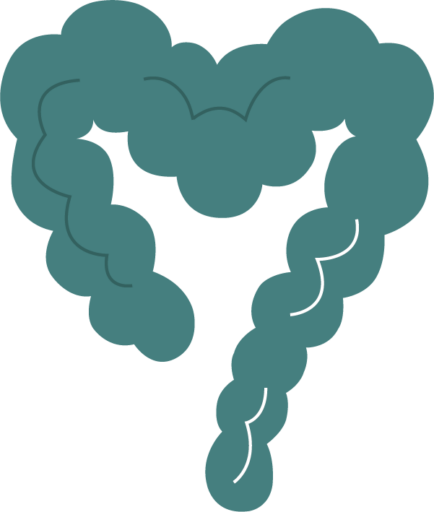
Symptoms
So what are our most common symptoms of IBS really? IBS (Irritable bowel syndrome) affects 15-20% of the world’s population. About 70% of those affected are women, but the disease also affects men and children.
Many people live their lives with troublesome gut without knowing they have IBS, which is not surprising. It’s not easy to know how the gut should act. Since there is no clinical test that can diagnose the disease, it is important to see a doctor when stomach symptoms affect daily life. A diagnosis is important to get the right help. Also, don’t fall for the many myths about IBS that circulate.
Common symptoms of IBS
Although the symptoms of IBS usually vary from person to person, there are several symptoms that most people experience.
- Bloated stomach (balloon stomach) – the stomach usually increases in size during the day. You may experience that the gut starts acting up after lunch, and you might need to have an extra pair of larger pants with you to work.
- Gas in the stomach – In addition to releasing gas at any time, gases can also cause bubbles, rumbling, and activity in the stomach. Moreover, gases can be painful.
- Constipation or diarrhoea – both fast and slow digestion are characteristic, and it is also possible to have both alternately.
- Incomplete bowel movements – a common symptom of IBS regardless of whether you have fast or slow digestion. You may recognise the feeling that you go to the toilet, and after just a short while, you have to go again. This usually happens in the morning when you are about to leave.
- Abdominal pain – can be a dull ache, stabbing pain, flare-ups, or cramps and usually occurs on the right or left side under the ribs where the colon makes two large bends. Many people have narrow intestines, and since there is also an increased sensitivity to pain, you notice immediately when the intestines start to expand.
Less common IBS symptoms include:
There are also symptoms of IBS that are less common and may not be directly associated with something going on in the gut. Examples of these less common symptoms of IBS include:
- Nausea
- Heartburn
- Fatigue
- Sleep problems
- Pain in the left shoulder
- Palpitations, double beats
- Anxiety, panic attacks
- Urinary urgency
Additional signs that you may have IBS:
Even if you do not always think about or categorise your physical symptoms, you may have IBS if you recognise yourself in these everyday situations. For many with IBS, the symptoms are intrusive and affect everyday life. Examples of such situations may include:
- You have to change your pants after lunch because your gut swells to double size.
- Colleagues comment on your rumbling gut AFTER lunch – then you might have thought that hunger should have subsided…
- You think more about your gut than your job, partner, or family. You probably calibrate the day after your stomach, skip things, take different routes, cancel social events, etc.
- You have to leave the meal urgently to run to the toilet. Barely had something come in before something else needed to come out.
- Your doctor says, “Well, we find no problems here, so you probably have to live with those gases.”
- You are not gluten or lactose intolerant, but you feel bloated and strange when you drink milk and eat bread.
Symptoms from what I ate last?
Yes, this is a very relevant question when it comes to when the symptoms occur. The most natural thing is to check how the stomach feels after eating. If it doesn’t feel good, you conclude that what you just ate was not good, but it’s not that simple.
The digestive system is complex, both in terms of function and communication. As you know, the food lands in the stomach, where it is then processed for about four hours depending on what you have eaten.
Liquid food like milk and juice goes faster, while a meal with vegetables, meat, and potatoes takes much longer. So it is practically impossible for what you just ate to directly cause symptoms. This is the explanation for why it is difficult to unravel the diet on your own and a significant risk that you remove completely wrong foods.
Running to the toilet in the middle of a meal
What then happens when you get symptoms immediately after a meal? Well, either it is the reflexes in the intestine that are strengthened so that, like a jet engine, they overreact when food is ingested, which is manifested in noise, discomfort, and an urgent need for a toilet. If you instead become gassy, it usually depends on what you ate 1-3 meals ago, depending on the speed of your stomach.
The food you just ate pushes down the intestinal contents, and it is only when it reaches the colon that there is a problem.
Another factor that complicates the situation is that we can actually stimulate the gut by smelling, for example, coffee. Then the gut in some automatically wants to empty itself, even though we have not ingested any coffee. This fact can then be used by keeping the cup of coffee that is important for emptying (for the constipation-predominant) and removing the one that only irritates the intestines unnecessarily (for the diarrhoea-predominant).
How to determine which foods cause IBS symptoms
There are a few areas that are important to understand to identify which foods cause your symptoms:
- The speed of your gut. Faster stomachs give faster symptoms, and slower stomachs give more prolonged symptoms.
- What you have eaten backwards in time. For a food diary, this becomes much more comfortable.
- FODMAP to understand which foods generate faster symptoms and which ones can potentially cause symptoms. Of the 25-30 foods we eat every day, maybe 10 are FODMAPs.
Through the structure of the low FODMAP diet (to first eliminate and then correctly reintroduce, you can learn more about which foods cause symptoms and keep those that are good to eat. Simple and important to have a more varied diet in the long run. You can undergo treatment digitally in the Belly Balance app.
Sofia Antonsson
Reg. Dietitian, Belly Balance
Take control of your IBS today!
Ready to reclaim your life from IBS? Our app provides the tools and guidance you need to manage IBS effectively.
Download the App



